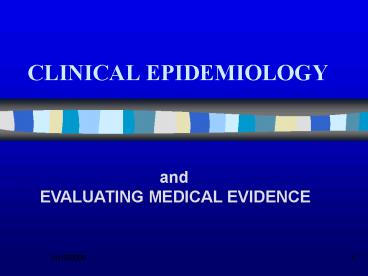CLINICAL EPIDEMIOLOGY - PowerPoint PPT Presentation
1 / 26
Title:
CLINICAL EPIDEMIOLOGY
Description:
Epidemiologists did 'epidemiology' paragraph. No one else had 'tools' for clinical research ... are for the most part 'epidemiologists'. 7/1/09. 14. These are ... – PowerPoint PPT presentation
Number of Views:112
Avg rating:3.0/5.0
Title: CLINICAL EPIDEMIOLOGY
1
CLINICAL EPIDEMIOLOGY
and EVALUATING MEDICAL EVIDENCE
2
Nasser Gayed, MD MPH
- Professor, Dept of Medical Information Science,
- COM at UC
- Teaching course since 1990.
- Course Director since 2000.
3
Why do I need to learn epidemiology?
- How much epidemiology does the average medical
student need to know? - If epidemiology has to do with epidemics the
answer is - Very little
4
I dont teach epidemiology
- What do I teach?
- Why is it called epidemiology?
- Why you need to know it?
5
What do I teach?
- The methods of clinical research
- The rules of evidence in evidence based
medicine
6
- Critical reading is a basic tool of the
practicing physician for keeping his or her
practice consistent with current medical
knowledge. The two main goals of this course are - To make students believe in the importance of
being able to evaluate medical research studies. - To provide them with the tools to do so.
7
Why is it called epidemiology?
8
For thousands of years
- Clinicians did not deal with numbers,
frequencies, distributions. Why? - Epidemiologists did
- epidemiology paragraph
- No one else had tools for clinical research
9
- All who drink of this treatment recover in a
short time, except those whom it does not help,
who all die. It is obvious, therefore, that it
fails only in incurable cases. - Galen c.199
10
- Clinical research only started in the middle of
the 20th century - Researchers started using the tools of
epidemiology to study chronic diseases. Example. - This made those tools more relevant and useful to
clinicians (and medical students). - This also expanded and defined the new discipline
of Clinical Epidemiology
11
Case in point
- Journal of Chronic Diseases established in 1955
- In 1987 they added a subtitle A Forum for
Clinical Epidemiology - In 1988 it became Journal of Clinical
Epidemiology
12
Clinical Epidemiology
- Became the home of the methodology of clinical
research
13
- Used to be The leaders of each specialty were
experienced clinicians. - Now It is those who publish important clinical
trials. Those are for the most part
epidemiologists.
14
These are the people in charge of
- Medical schools
- Residency programs
- Fellowship programs
- Faculty appointments and promotions
- Grant approvals
- And more
15
Why you need to know it?Sally Hoskins
16
Why you need to know it?
- Atrial fibrillation
- Atrium does not contract
- Mitral Stenosis
- Dilated
- Blood clot
- Warfarin (Coumadin)
- Non-valvular AF
- If TIA/CVA then warfarin
17
- Warfarin for all? Is aspirin enough?
- Randomize to Warfarin, ASA, or placebo.
- Many contraindications
- Exclusion criteria
18
- Still many should not be on warfarin. Exclusion
criteria not enough. - How many?
- A whole lot!
- What then?
- Patients own clinician to approve.
- Lets do it
19
Meeting with clinicians
- Warfarin better. Abstract.
- Clinicians Many patients should not be on
warfarin. Now they might. - Reply Why? During our study there were patients
that should not be on warfarin and they didnt
receive warfarin. - Clinicians Yes, but that was before there was a
study in a prominent journal that reads
..warfarin was superior to aspirin and placebo
20
- Who will protect these patients?
- Reply Their own clinicians just like you guys
did. - Clinicians But that is only if they read more
than the abstract. - And, if they know what to look for and know what
it means.
21
Reply
- Dont you guys teach them that stuff in medical
school?! - The End
22
SPAF Trial
- Stroke Prevention in Atrial Fibrillation
- 627 patients were randomized to warfarin,
aspirin, or placebo - Warfarin was superior.
23
Average Clinicians Conclusion
- Every patient with atrial fibrillation who
doesnt have any of the exclusion criteria should
receive warfarin. - You would reach that conclusion if you read the
articles abstract and conclusion.
24
My Conclusion
- Not every patient with atrial fibrillation should
be started on warfarin. - My reason?
- I read the whole article.
- What did I find?
25
They Started with 18,376 Patients!
- Thats not bad by itself.
- Most were excluded for appropriate criteria
- BUT among the excluded
- 717 refused
- Another 1,084 their doctors refused
- Another 2,262 no reason was recorded
- Another 239 patient or doctor refused
anticoagulation. (So they were randomized into
the aspirin versus placebo trial.)
26
Compare These Numbers
- 717 refused
- Another 1,084 their doctors refused
- Another 2,262 no reason was recorded
- Another 239 patient or doctor refused
anticoagulation. (So they were randomized into
the aspirin versus placebo trial.) - To 627 randomized (210 ended on warfarin)































